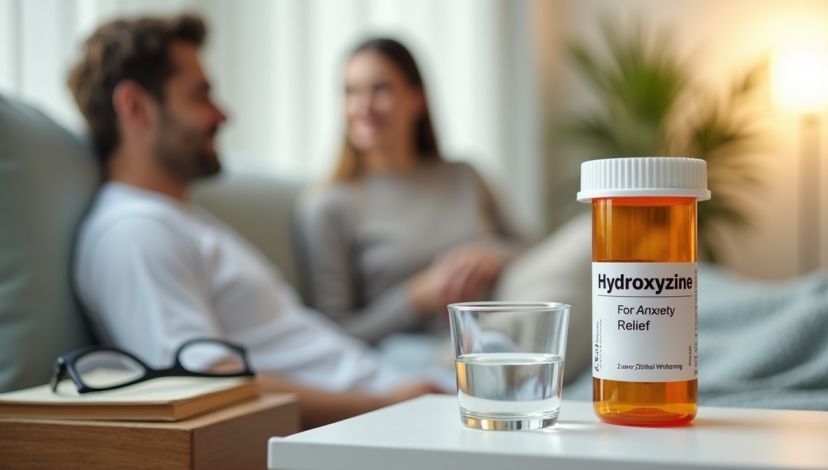Hydroxyzine for Anxiety: 7 Must-Know Facts [2025 Guide]

Millions of people across the world are stricken with an anxiety disorder, and a treatment method that can be effective is very imperative to enhance quality of living. Among the various medications available, hydroxyzine for anxiety has gained attention as a fast-acting, non-addictive option. Hydroxyzine is used to treat anxiety symptoms, although the drug was initially designed as an antihistamine prescribed to fight allergies. Its effect to sedate and provide a state of relaxation provides relief, especially to any person in need of instant relief of anxiety or ones who are not able to ingest regular anti-anxiety medications.
Table of Contents
- What is Hydroxyzine and how does it work on anxiety?
- Use Case:
- Hydroxyzine vs. A Comparison with Other Anxiety Medications
- Benefits and Limitations of Hydroxyzine for Anxiety
- Facts Behind the Scope:
- Practical Practices: Dosage, side effects, and important safety information.
- Dosage
- Side Effects
- Safety Precautions
- Future Outlook and Research on Hydroxyzine for Anxiety
- Table: The Comparisons of Hydroxyzine with Buspirone and Benzodiazepines on Reducing Anxiety
- Conclusion
- FAQs
Patients and caregivers may be informed and empowered into making chick decisions about hydroxyzine by understanding or knowing its uses and mechanisms of action as well as possible benefits, side effects, and its comparison with other therapies. You are either newly diagnosed with generalized anxiety disorder (GAD) or you are trying to find an alternative source of treating anxiety-in that case, take a look at hydroxyzine.
Key Takeaways:
- This medicine, hydroxyzine, is effective in treating generalized anxiety disorder (GAD) and associated disorders and gives immediate relief.
- It does not act like a normal antidepressant, and it has fewer chances of dependency.
- Drowsiness is the most common, and it wears out after the first consumption.
What is Hydroxyzine and how does it work on anxiety?
Hydroxyzine is one of the antihistamine drugs that initially aimed at providing relief of the symptoms of allergy, including itching or hives. But it also works on the central nervous system to alleviate the anxiety by obstructing histamine receptors and affecting the level of serotonin in the brain. Serotonin is the neurotransmitter that balances mood, and the influence of hydroxyzine on stimulating the availability of serotonin allows correcting the symptoms of anxiety.
In contrast to benzodiazepines, which directly stimulate anxiousness receptors and result in the high-dependence danger, hydroxyzine is a non-addictive approach to short-term stress therapy. It is usually prescribed in both adults and children and, in particular, with respect to generalized anxiety disorder (GAD), panic attacks, or as an intervention of sleep disturbances associated with anxiety.
A 1994 double-blind clinical trial of 133 patients with GAD showed that 50 mg of hydroxyzine daily succeeded in reducing anxiety ratings by a substantial amount as compared to people on placebo, and the effect continued throughout the treatment. This indicates the prospect of hydroxyzine as a fast-acting anxiolytic.
Use Case:
Sarah is a 32-year-old person with GAD, and hydroxyzine helped her ascertain the use of the drug during sudden-onset anxiety episodes, awaiting her SSRI-modulated medication to work. It has contributed to the fact that she sleeps better and does not experience panic attacks, and she is not feeling groggy all day long.
Hydroxyzine vs. A Comparison with Other Anxiety Medications
Comparisons of the various options are usually made when getting the right medication. The comparative table presented below gives a simplified overview of the hydroxyzine in relation to some of the most popular anxiety medications: benzodiazepines and SSRI (selective serotonin reuptake inhibitors).
| Feature | Hydroxyzine | Benzodiazepines | SSRIs (e.g., Escitalopram) |
| Drug Class | Antihistamine | Benzodiazepine | Antidepressant |
| Onset of Action | 30-60 minutes | Minutes to an hour | Several weeks |
| Risk of Dependency | Low | High | Low |
| Common Side Effects | Drowsiness, dry mouth | Sedation, dizziness | Nausea, sexual dysfunction |
| Use Duration | Short-term | Short or long-term | Long-term maintenance |
| FDA Approval for Anxiety | Yes | Yes | Yes |
| Suitable for Sleep Aid | Yes | Yes | Sometimes |
Table Description: This table contrasts hydroxyzine to the other types of medications used in relieving anxiety i.e., benzodiazepines, and SSRIs.
Note: The sedative effect of hydroxyzine is not always appropriate in alertness-related activities, and therefore, caution is highly recommended, particularly during the initiation stage of treatment.
Benefits and Limitations of Hydroxyzine for Anxiety
Hydroxyzine has a variety of advantages, which makes it an appealing treatment of anxiety:
- Fast Acting: Hydroxyzine generally works in 30-60 minutes, thus can be applied in case of a desperate anxiety case or emergency of an emergency attack.
- Non-Addictive: Hydroxyzine does not lead to dependence and withdrawal symptoms in comparison to benzodiazepine drugs, and this facilitates better, safer short-term use.
- Dual Use: Other than treating anxiety, it is effective in managing itching and symptoms of an allergic reaction, making it useful.
- Adjunct Therapy: This therapy has been effective as an interim medication when long-term depression drugs, such as SSRIs, are taking some time to take action.
Nevertheless, this is restricted:
- Tolerance: Some patients can develop tolerance with time, hence, effectiveness is lower.
- Side Effects: Common ones include drowsiness, dry mouth, dizziness, and fatigue; the sleepiness normally decreases within several days of treatment.
- Not to be used Long-term: Hydroxyzine is usually advised to be used short-term or periodically, and not as an anxiolytic technique in the long-term perspective.
Facts Behind the Scope:
According to Dr. Michael K. Newman, a board-certified plastic surgeon, hydroxyzine can be of great assistance as an alternative to those who are intolerant and/or do not respond to benzodiazepines.
Practical Practices: Dosage, side effects, and important safety information.
Dosage
Treatment of Anxiety The normal dosage is between 50-100 mg two to four times a day, depending on the severity of the case and the suggestions of the doctor. Hydroxyzine is sold inthe form of tablets, and capsules, and syrup, and its optimal effect is reached approximately 30 to 60 minutes after its intak,e with a life of 4 to 6 hours.
Side Effects
Side effects (typical of most drugs) are:
- Somnoleness or sedation
- Dizziness
- Dry mouth
- Fatigue
Serious side effects are uncommon and may consist of an allergic reaction or disbalance of the heart rhythm. Hydroxyzine is usually contraindicated in the elderly and pregnant women or those who are breastfeeding their babies, as there are higher risks of a person developing adverse effects.
Safety Precautions
- Do not use/ drink alcohol or other CNS depressants together with hydroxyzine.
- Avoid driving and performing heavy works until you are familiar with the impacts of the medication.
- Tell your doctor about heart diseases or antihistamine allergy.
Note: Do not ever change the dose on your own and use it in accordance with the prescriptions.
Future Outlook and Research on Hydroxyzine for Anxiety
Hydroxyzine is a well-researched treatment of generalized anxiety disorder (GAD). Hydroxyzine was confirmed by a Cochrane review to provide a statistically significant difference in the effect of an anxiolytic burden in comparison with placebo, with good tolerability and without withdrawal symptoms. It is a crucial albeit poorly used alternative, at least when a rapid symptom alleviation is required.
Table: The Comparisons of Hydroxyzine with Buspirone and Benzodiazepines on Reducing Anxiety
| Medication | Onset Time | Dependency Risk | Suitable For | Common Side Effects |
| Hydroxyzine | 30–60 minutes | Low | Short-term anxiety | Drowsiness, dry mouth |
| Buspirone | 2–4 weeks | Low | GAD | Dizziness, headache |
| Benzodiazepines | Minutes to an hour | High | Acute anxiety | Sedation, dizziness |
The Description of the Table: A comparison of the hydroxyzine, buspirone, and the benzodiazepines with a demonstration of the onset, risks, and side effects when used as anxiety medications.
Regulatory agencies and the psychiatrists prescribe hydroxyzine firmly as the supplementary or time-limited alternative, not as the one and only long-term treatment. It is also used in studying its application on panic disorder, but the evidence is weaker.
Conclusion
Hydroxyzine for anxiety offers a valuable alternative or complement to traditional anti-anxiety medications. It is useful in the treatment of anxiety, particularly generalized anxiety disorder, because of its capacity to bring on rapid relief without the danger of dependency associated with benzodiazepines. In spite of this, tolerance to medications and side effects such as drowsiness indicate that it is only advisable to be used under close supervision by a medical department and usually in the short term.
When someone is living with anxiety or knows a loved one who has this condition, one of the next steps that should be taken is to discuss taking hydroxyzine along with a more holistic approach toward treatment that can include counseling and taking other drugs. Healthcare professionals should be consulted every time and personalize or customize the treatment relative to the benefits and risks.
More information can also be found in our article Ketamine Therapy for Depression: Fast Relief and Brain Healing.
FAQs
Q1: How fast does hydroxyzine solve anxiety?
A: The Usual action of hydroxyzine is observed between 30 minutes to 1 hour of administering the dose.
Q2: Does hydroxyzine have any addictive property?
A: No, hydroxyzine is not addictive and is low dependant as compared to benzodiazepines.
Q3: What are the common side effects of hydroxyzine for anxiety?
A: The side effects are listed as drowsiness, dry mouth, dizziness, and fatigue are the most common ones.
Q4: Is hydroxyzine a long-term treatment of anxiety?
A: Hydroxyzine is usually accepted to be used short-term; the long-term use should be considered by a health practitioner.
Q5: What makes hydroxyzine different into other anxiety meds, such as SSRIs?
A: Hydroxyzine is a sedating antihistamine and has an immediate effect as compared to SSRIs, which take weeks before they take effect, and they act on serotonin absorption in a long-term basis.
Latest Posts
You Might Also Like

Chipotle Nutrition – Your go-to guide for calories, healthy choices, and balanced meals at Chipotle.
TOP NEWS
© Copyright 2026 Chipotle Nutrition. All rights reserved














No Comments